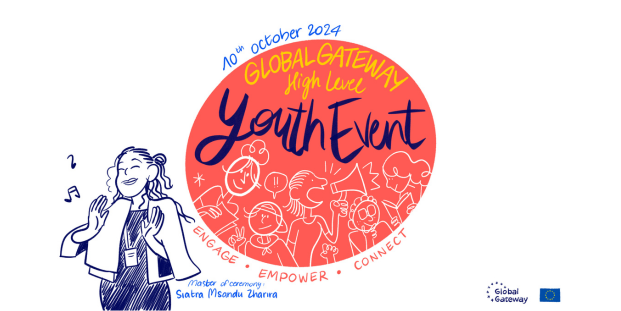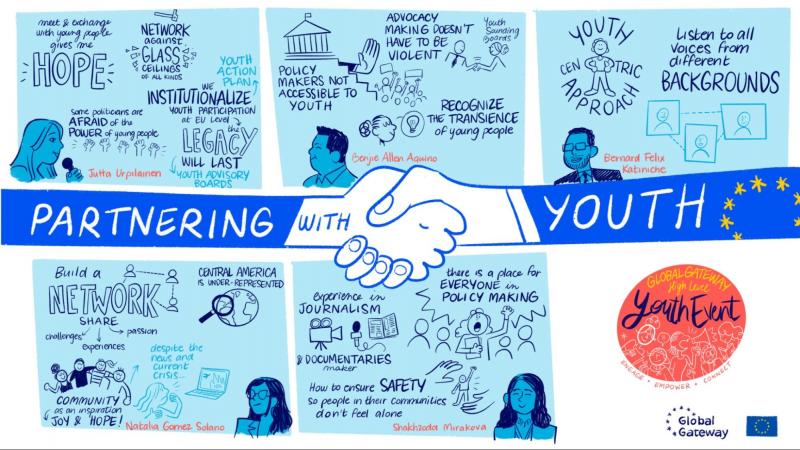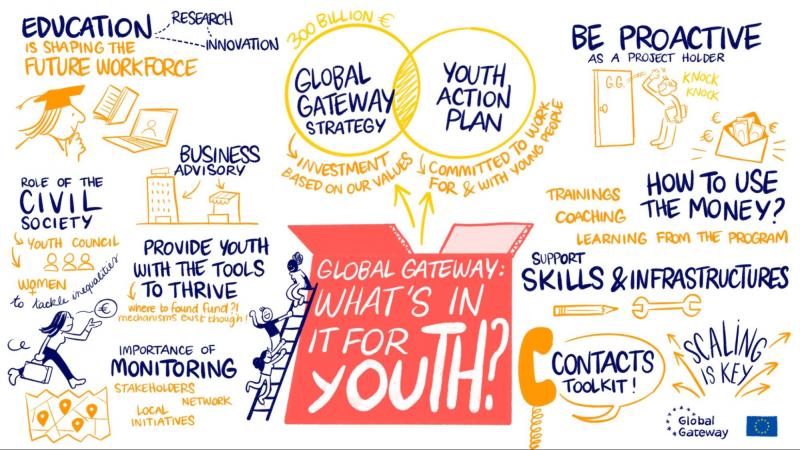
The Global Gateway High-Level Youth Event, held on October 10th in Brussels, brought together youth representatives, EU officials, and global leaders to discuss the pivotal role of young people in shaping policies and driving sustainable development. Organised by the European Commission’s Directorate-General for International Partnerships, this event highlighted the EU’s dedication to youth empowerment through initiatives such as the Youth Action Plan in External Action.
Setting the Stage for Youth Empowerment: A Collective Call to Action
The event started with welcoming addresses from notable figures, including Ursula von der Leyen, President of the European Commission, and Jutta Urpilainen, European Commissioner for International Partnerships. Commissioner Urpilainen emphasised the importance of youth participation, stating, “Empowering young people with the resources they need is not just a commitment; it is a necessity.” With over 220 stakeholders involved, the Youth Action Plan is a testament to the EU’s dedication to fostering meaningful youth engagement, with initiatives such as establishing 100 youth focal points in EU delegations worldwide.
Felipe Paullier, UN Assistant Secretary-General for Youth Affairs, followed the opening session. He underscored the urgency of recognising youth as present leaders, not just future ones. He highlighted the importance of embedding youth perspectives in global agreements, urging stakeholders to “engage, empower, and connect” with young people to scale up youth-led initiatives. This call to action resonated with ESN’s mission to represent youth in various forums and enhance their participation in decision-making processes.

Most of the event focused on the collaborative efforts between young people and European institutions. This session, moderated by Siatra Msandu Zharira, showcased testimonies from members of the EU Youth Sounding Board, including Benjie Allen Aquino and Shakhzoda Mirakova. Their stories illustrated the impact of intergenerational dialogue and the importance of nurturing a dynamic ecosystem where young people can co-lead initiatives. The emphasis on breaking barriers to increase youth participation aligns perfectly with the objectives outlined in the Youth Action Plan, as discussed in the report by ESN published more than one year ago, as a reaction paper to the Youth Action Plan in EU External Action.
On this occasion, we could see closely the first mid results of the Youth Action Plan in the session titled “Breaking Barriers”, highlighting the implementation of the Youth Action 2022-2027 Plan and the critical role of youth stakeholders in facilitating this process. Qyira Yusri moderated a discussion emphasising the need for organic, youth-driven ecosystems. Speakers, including Carlos Sanvee and Francisca Midzi, stressed the importance of creating youth-friendly funding schemes and ensuring that youth voices are integrated into institutional processes. This aligns with ESN’s ongoing efforts to advocate for more accessible funding for youth initiatives, reinforcing the need to shift how youth participation is viewed and supported.

A key theme of the event was the Global Gateway strategy, which aims to enhance partnerships between the EU and its global counterparts. Moderated by Geth Semani Akhenra Maiga, this session focused on the role of youth in the Global Gateway initiative, discussing examples of youth involvement in various sectors, including education and climate action. Marjeta Jager, Deputy Director General of the European Commission, echoed the urgency of investing in digital, transport, and climate-related projects and highlighted the significant investment gap in sustainable development.
The day was concluded with a fireside chat moderated by Giacomo Castorina Calí, which focused on the importance of peace and democracy in a geopolitically challenging world. Discussions led by speakers such as Olof Skoog, EU Special Representative for Human Rights, highlighted the necessity of creating an enabling environment for the Global Gateway Strategy. The insights shared during this session underscored the need for continuous youth engagement in peacebuilding processes and promoting democratic values.

The closing session provided a platform for youth representatives to present recommendations for the next European Commission. Naja-Theresia Høegh moderated discussions centring around three key areas: Engage, Empower, and Connect. The recommendations are a forward-looking expression of views by young people. They are designed to inform and inspire the political leadership of the European Commission to keep youth among political priorities for its new mandate.
The young people endorse the ongoing implementation of the Youth Action Plan and recommend,
Under the Partnership to Engage,
- Continue establishing EU Youth Sounding Boards and their regional networks and equipping the EU Delegations with stable means and solid skills to collect and integrate young people’s input. This ensures that youth engagement is substantive and co-creative.
- Integrate youth perspective in the country roadmaps for EU engagement with civil society and in the Global Gateway Civil Society and Local Authorities Advisory Platform.
- Develop a more comprehensive Monitoring and Evaluation system that tracks youth contributions’ relevance, effectiveness, and inclusivity.
- Strengthen the role of youth in peacebuilding and conflict resolution by establishing a dedicated EU Youth Peace and Security Forum and collaborating with existing youth structures.
- Remove structural barriers to the participation of marginalised and underrepresented youth by providing targeted outreach and financial support.
Under the Partnership to Empower,
- Integrate youth and enhance youth-specific projects within Global Gateway infrastructure initiatives by dedicating a specific portion of the available €300 billion funding to youth-led innovation projects, creating youth advisory committees, and establishing Global Gateway Youth Fellowships.
- Continue building young people’s leadership skills by expanding capacity-building and peer learning programmes, especially for rural and underserved regions, and introducing virtual apprenticeship and entrepreneurial exchange platforms.
- Create partnerships for data collection in rural and disadvantaged areas addressing the critical lack of reliable data on the specific conditions and needs of youth populations, especially marginalised youth.
- Increase the accessibility of education and healthcare for youth in crisis contexts by expanding the EU's support to the healthcare and education sectors in emergencies.
Under the Partnership to Connect,
- Foster global youth networking and further reduce barriers to participation by launching targeted awareness campaigns and mentorship programs.
- Develop a Global Youth Information Hub, expanding virtual exchange programs and introducing a dedicated fund to cover travel, visa costs, and participation fees for marginalised youth to ensure their full inclusion in international exchange and mobility programs.

These recommendations resonate deeply with ESN’s vision and mission to foster a culture of youth participation and empowerment. This is done by strengthening youth perspectives in peacebuilding, ensuring their voices are integrated into policy decisions, advocating for better allocation of funds for youth-led initiatives, and enhancing leadership skills among young people, particularly in EU neighbourhood and partner countries from the Global South.
The Global Gateway High-Level Youth Event was a crucial platform for ESN to engage with key stakeholders and reinforce its commitment to empowering youth as the EU moves forward with its Youth Action Plan. Erasmus Student Network shall persist in its advocacy for significant youth participation in formulating policies that influence their lives. Collectively, we can guarantee that young individuals serve not merely as participants but as leaders in the global discourse on sustainable development and social change.
ESN’s attendance at the event allowed us to identify new stakeholders, EU delegations, and youth organisations from Africa and to connect with them. To enhance ESN activities in the region and promote substantial international mobility within EU external action and global strategy, ESN needs to establish a strong and strategic partnership with peer-to-peer partners in Africa, an EU neighbourhood. On this occasion, we networked and reached out to the following institutions and organisations:

Emna Memmi, Liaison Officer for Africa and Middle East, represented Erasmus Student Network (ESN) in the Global Gateway High-Level Youth Event, Brussels, 10th of October of 2024.
Visit ESN and EU Global Gateway for more information on the Global Gateway strategy and the Youth Action Plan.

Follow ESN